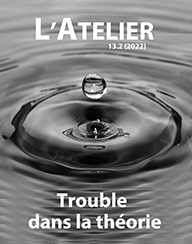Genre/Gender Trouble? Crossing Literary and Queer Epistemologies
Abstract
This paper discusses issues that have, almost simultaneously, though distinctly, haunted two fields of theory since the 1990s: one concerning queer epistemologies of gender, the other relating to theories of the literary genre. In order to underline this relationship between the two subjects (an assumption made by plenty of textual analysis, yet little discussed within the francophone literary studies), I would like to suggest a cross-reading of Judith Butler's Gender Trouble (1990) and Jean-Marie Schaeffer's Qu'est-ce qu'un genre littéraire ? (1989). My goal here is to bring to light an analogy between the mutations undergone by the notions of both gender and genre, by relying on a set of ideas previously used to reflect on their evolution, their objection and their historical and conceptual rehabilitation: the notions of binarism, essence and performance. For instance, this theoretical panorama will allow me to link the notion of genericity, introduced by Schaeffer, to the queer concept of subversion. I will then suggest that cross-referencing those two perspectives within a methodology of textual analysis will significantly enrich the reading of works challenging the place assigned to women (keeping in mind the fact that the object "woman" is without essence itself) while disputing architextual classifications. I strongly believe that this parallel, beside highlighting some shared trouble and an inclination towards the non-exclusivity of categories, will prevent scholars from containing the generic question into a typological exercise while allowing us to consider the destinies of female characters in novels as an effect of socialization rather than the excuse of nature.
Keywords: genre, gender, genericity, subversion, performance
Downloads
Published
Issue
Section
License
- Work submitted for publication must be original, previously unpublished, and not under consideration for publication elsewhere. If previously published figures, tables, or parts of text are to be included, the copyright-holder's permission must have been obtained prior to submission.
- Authors of accepted manuscripts will assign to L'Atelier the right to electronically distribute their article, or publish it in any form (Internet, CD ROM, printed copy) but authors will retain copyright and, after the article has appeared in L'Atelier, authors may republish their text (in print and/or electronic form) as long as they clearly acknowledge L'Atelier as the original publisher.


